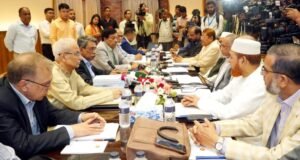 Expatriates have overwhelmingly welcomed the announcement by Deputy Crown Prince
Expatriates have overwhelmingly welcomed the announcement by Deputy Crown Prince
Muhammad Bin Slman, second deputy premier and minister of defense, that Saudi Arabia was
planning to give permanent residency to foreign workers similar to the US Green Card system.
“The Green Card-like program and a plan to allow employers to hire more foreign workers above
their official quotas for a fee could generate $10 billion a year each,” the deputy crown prince told
Bloomberg in an exclusive interview.
Nidal Ridwan, chairman of the Federation of Labor Committees in the Kingdom, told Okaz/Saudi
Gazette that he expected the formation of an independent authority to implement the new system.
He said the new authority under the Cabinet would supervise implementation of the system. It will
have representatives from the ministries of economy and planning, interior, labor, commerce and
industry, and finance, as well as Saudi Arabian Monetary Agency, Saudi Arabian General Investment
Authority and General Organization for Social Insurance.
“The new system will bring a lot of economic and social benefits. Non-Saudis will pay what the
Saudis pay including Zakat, value added tax and insurance premiums. They will be allowed to own
real estate and run trade, industry and service firms,” said Ridwan.
“If it is implemented, I will be the first to apply,” said Dr. M.S. Karimuddin, a long-time resident of
Jeddah.
“It’s excellent news for expatriates. This will give confidence to them that they belong to this
country,” said Karimuddin, a well-known pediatrician and a recipient of India’s Pravasi Bharatiya
Samman (Indian Diaspora Award).
“Already we are very satisfied with everything here. But this initiative will give excellent opportunity
to expatriates to serve more,” he said. Similar views were expressed by Inayat Ramjean, a Mauritian
national who works as Business Development Manager for Hilton Group of hotels.
“The Deputy Crown Prince is a man of great vision. And this move is part of his vision to integrate
expatriates to make them part of the Kingdom and utilize their expertise for the development of the
Kingdom. This gesture will motivate expatriates to work even harder and contribute in the welfare of
the Kingdom,” he said.
“It is a positive move and a visionary initiative,” said Zulqarnain Ali Khan, a Pakistani national who is
chairman and CEO of Zultec Group. He said that the benefit will be more than $10 billion a year. It
will be much larger as expatriates will come and open their businesses here. It will also help build
local skills and develop human resources, Khan added.
The planned move is part of an ambitious package of reforms to move away from oil based revenue
to raise at least an extra $100 billion a year by 2020. The planned Green Card system could generate
$10 billion, and another $10 billion is expected to be generated from the fees imposed to exceed
foreign worker quotas.
US Green Card is a lawful permanent residency which allows a person to live and work there. The
United States Permanent Resident Card is informally called a green card because “it was green from
1946 until 1964 and on May 11, 2010 it was reverted to the color green.”
 Weekly Bangla Mirror | Bangla Mirror, Bangladeshi news in UK, bangla mirror news
Weekly Bangla Mirror | Bangla Mirror, Bangladeshi news in UK, bangla mirror news






